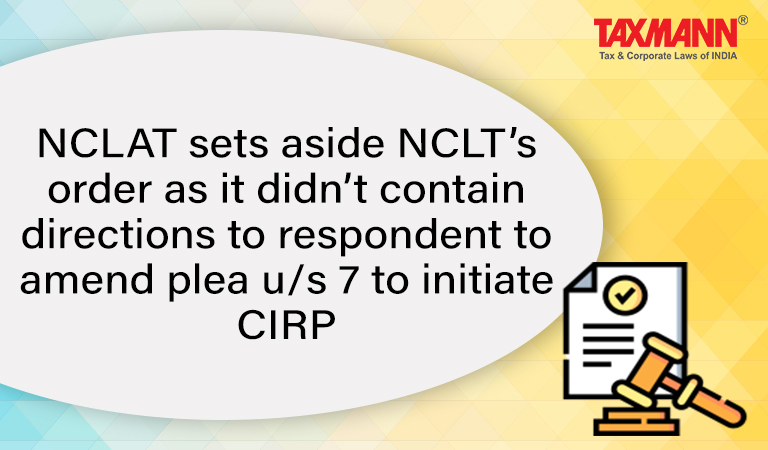NCLAT sets aside NCLT’s order as it didn’t contain directions to respondent to amend plea u/s 7 to initiate CIRP
- Blog|News|Insolvency and Bankruptcy Code|
- 3 Min Read
- By Taxmann
- |
- Last Updated on 10 March, 2022

Case Details: Emaar Hills Township (P.) Ltd. v. Srinivas Manthena - [2022] 135 taxmann.com 367 (NCLAT - Chennai)
Judiciary and Counsel Details
-
- M. Venugopal, Judicial Member and Kanthi Narahari, Technical Member
- Sajan Poovayya, Sr. Adv., Sriram, Abhishek Sharma, Ravi Charan, Ms. Ashly Cherian and Kamlendra Singh, Advs. for the Appellant.
Facts of the Case
In the instant case, the appellant-corporate debtor created as a Special Purpose Vehicle for development and construction of a township as an integrated project. The respondents and 64 other allottees (home buyers) filed an application under section 7 against the corporate debtor.
Insolvency and Bankruptcy Code (Amendment) Ordinance, 2019 was promulgated by Government of India on 28-12-2019 to amend provisions of I&B Code – Ordinance mentions that an application under section 7 for initiating CIRP against corporate debtor shall be filed jointly by not less than 100 all such creditors (i.e. home buyers) or not less than 10 per cent of total number or such creditors (home buyers), whichever is less.
In the instant case no joint application was filed by the creditors for initiating the CIRP against the corporate debtor.
The Adjudicating Authority by the impugned order held that single allottee’s application filed before the amendment cannot be rejected and further held that the allottees in the same project against the same corporate debtor were allowed to pursue their applications jointly.
The appellant filed an appeal before the Appellate Tribunal against the impugned order passed by the adjudicating authority.
Appellant contended that the 3rd proviso of Section 7 (1) of the IBC, 2016 provides that the application admitted by the Adjudicating Authority before the commencement of the ordinance, such application shall be modified within thirty days of the commencement of the said Ordinance, failing which the application shall be deemed to be withdrawn before its admission.
According to the Appellant, neither the Respondent nor other purported allottees of the appellant had filed an application seeking modification of their affidavit as envisaged under the amended section 7.
NCLAT Held
The Appellate Tribunal taking into consideration inter conceptus of the facts of the instant case, in an integral manner and keeping in mind the dictum laid down by the Supreme Court in the case of Manish Kumar (supra) comes to a resultant conclusion that the impugned order passed by the Adjudicating Authority suffers from legal infirmities in the eyes of law and the same is set aside by the Tribunal to secure the ends of justice. As the Adjudicating Authority overlooked the provisions as laid down in the section 7 (1) regarding the modification of the applications filed before the commencement of the ordinance.
Thus, the Appeal is allowed and the matter is remitted back to the Adjudicating Authority for passing de novo orders on the issue of maintainability pertaining to clubbing of all matters in the teeth of the Supreme Court judgment and in accordance with Law, of course, after providing due opportunities to both parties to raise all factual and legal pleas, if they so advised.
Case Review
-
- Srinivas Manthena v. Emaar Hills Township (P.) Ltd. [2022] 135 taxmann.com 366 (NCLT – Hyd.) (para 21) reversed. [See Annex].
- Manish Kumar v. Union of India [2021] 123 taxmann.com 343 (SC) (para 19) followed.
List of Cases Referred to
-
- Manish Kumar v. Union of India [2021] 123 taxmann.com 343 (SC) (para 3)
Disclaimer: The content/information published on the website is only for general information of the user and shall not be construed as legal advice. While the Taxmann has exercised reasonable efforts to ensure the veracity of information/content published, Taxmann shall be under no liability in any manner whatsoever for incorrect information, if any.

Taxmann Publications has a dedicated in-house Research & Editorial Team. This team consists of a team of Chartered Accountants, Company Secretaries, and Lawyers. This team works under the guidance and supervision of editor-in-chief Mr Rakesh Bhargava.
The Research and Editorial Team is responsible for developing reliable and accurate content for the readers. The team follows the six-sigma approach to achieve the benchmark of zero error in its publications and research platforms. The team ensures that the following publication guidelines are thoroughly followed while developing the content:
- The statutory material is obtained only from the authorized and reliable sources
- All the latest developments in the judicial and legislative fields are covered
- Prepare the analytical write-ups on current, controversial, and important issues to help the readers to understand the concept and its implications
- Every content published by Taxmann is complete, accurate and lucid
- All evidence-based statements are supported with proper reference to Section, Circular No., Notification No. or citations
- The golden rules of grammar, style and consistency are thoroughly followed
- Font and size that’s easy to read and remain consistent across all imprint and digital publications are applied



 CA | CS | CMA
CA | CS | CMA
